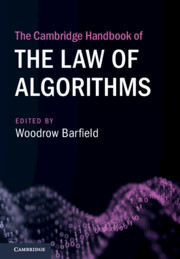Book contents
- The Cambridge Handbook of the Law of Algorithms
- The Cambridge Handbook of the Law of Algorithms
- Copyright page
- Contents
- Figures
- Tables
- Notes on Contributors
- Foreword
- Preface
- Acknowledgements
- Abbreviations
- Part I Introduction and Setting the Stage for a Law of Algorithms
- Part II Business, Regulations, and Decision-Making with Algorithms
- 6 Algorithms and Contract Law
- 7 Algorithms, Agreements, and Agency
- 8 Algorithmic Governance and Administrative Law
- 9 Discrimination in the Age of Algorithms
- 10 Algorithmic Competition, Collusion, and Price Discrimination
- 11 The Rule of Law and Algorithmic Governance
- 12 Governance of Algorithms
- 13 From Rule of Law to Statute Drafting
- 14 Algorithmic Decision Systems
- 15 From Legal Sources to Programming Code
- Part III Intellectual Property and Algorithms
- Part IV Criminal Law, Tort Issues, and Algorithms
- Part V Constitutional Law, Human Rights, and Algorithms
- Part VI Applications and Future Directions of Law and Algorithms
- Index
13 - From Rule of Law to Statute Drafting
Legal Issues for Algorithms in Government Decision-Making
from Part II - Business, Regulations, and Decision-Making with Algorithms
Published online by Cambridge University Press: 19 October 2020
- The Cambridge Handbook of the Law of Algorithms
- The Cambridge Handbook of the Law of Algorithms
- Copyright page
- Contents
- Figures
- Tables
- Notes on Contributors
- Foreword
- Preface
- Acknowledgements
- Abbreviations
- Part I Introduction and Setting the Stage for a Law of Algorithms
- Part II Business, Regulations, and Decision-Making with Algorithms
- 6 Algorithms and Contract Law
- 7 Algorithms, Agreements, and Agency
- 8 Algorithmic Governance and Administrative Law
- 9 Discrimination in the Age of Algorithms
- 10 Algorithmic Competition, Collusion, and Price Discrimination
- 11 The Rule of Law and Algorithmic Governance
- 12 Governance of Algorithms
- 13 From Rule of Law to Statute Drafting
- 14 Algorithmic Decision Systems
- 15 From Legal Sources to Programming Code
- Part III Intellectual Property and Algorithms
- Part IV Criminal Law, Tort Issues, and Algorithms
- Part V Constitutional Law, Human Rights, and Algorithms
- Part VI Applications and Future Directions of Law and Algorithms
- Index
Summary
The (un)limited potential of algorithmic decision-making is increasingly embraced by numerous private sector actors, ranging from pharmaceutical to banking, and from transport industries to powerful Internet platforms. The celebratory narratives about the use of big data and machine-learning algorithms by private companies to simulate intelligence, improve society, and even save humanity are common and widespread. The deployment of algorithms to automate decision-making also promises to make governments not only more efficient, but also more accurate and fair. Ranging from welfare and criminal justice, to healthcare, national security, and beyond, governments are increasingly relying on algorithms to automate decision-making – a development which has been met with concern by many activists, academics, and members of the general public.1 Yet, it remains incredibly difficult to evaluate and measure the nature and impact of automated systems, even as empirical research has demonstrated their potential for bias and individual harm.2 These opaque and elusive systems often are not subject to the same accountability or oversight mechanisms as other public actors in our legal systems, which raises questions about their compatibility with fundamental principles of public law. It is thus not surprising that numerous scholars are increasingly calling for more attention to be paid to the use of algorithms in government decision-making.3
Information
- Type
- Chapter
- Information
- The Cambridge Handbook of the Law of Algorithms , pp. 251 - 272Publisher: Cambridge University PressPrint publication year: 2020
